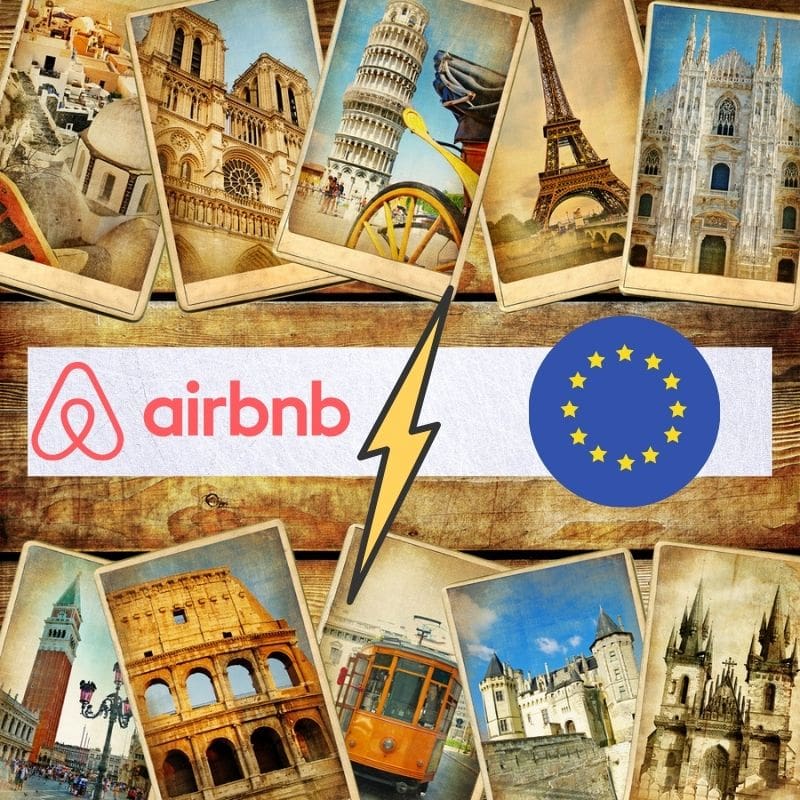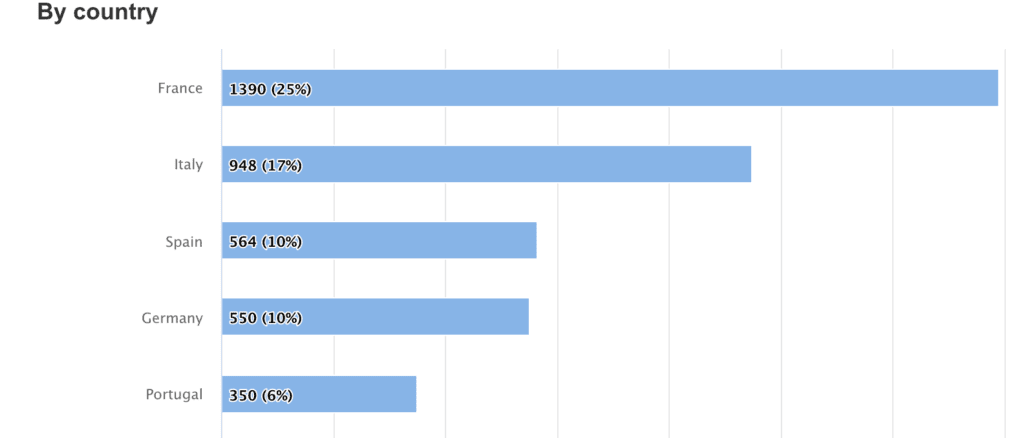With its “Short-Term Rental Initiative”, the European Union wants to simplify short-term rental regulations across Europe. The text, to be adopted by the European Commission in the first quarter of 2022, would ensure that clear and simple rules are in place for short-term rentals across the EU. The public consultation ended on December 13, just as Airbnb made public its own feedback on the proposal. The European Union is Airbnb’s number one market in the world in terms of the number of hosts and guests. The company is supporting harmonized EU rules and making thought-provoking proposals, from supporting an EU host register, recommending the creation of centralized database where platforms like Airbnb would report host activity (e.g. number of booked nights), making the registration easy and free for individual hosts.
What is the EU Short-Term Rental Initiative?
In October 2021, we covered the EU’s Short-Term Rental Initiative for the first time. The EU acknowledges that “across the EU, short-term rental market players are subject to a wide variety of regulatory and often burdensome requirements, often adopted at a local level, which can create market access barriers and make it more difficult to provide short-term rental services, in particular for small and medium enterprises”.
Across Europe, we often hear the EU is not transparent or democratic. Yet, it’s been fascinating to see how little interest this consultation has generated among owners and property managers. Some national associations, for instance in France, Spain, and Portugal have reacted and given some feedback.
Most respondents to the public consultations came from France (25%), Italy (17%), Spain (10%), and Germany (10%), which together make 62% of the contributions. Given the demographic weight and importance of the short-term rental industry, it was to be expected.
Timeline of the EU Short-Term rental initiativeRoadmap
Feedback period:
16 September 2021 – 14 October 2021
FEEDBACK: CLOSED
Public consultation:
Consultation period
27 September 2021 – 13 December 2021
FEEDBACK: CLOSED
Commission adoption:
Planned for
First quarter 2022
FEEDBACK: UPCOMING
The EU Host Action Plan: Airbnb’s take on the EU Short-Term Rental Initiative
Airbnb has published a press release and shared a PDF version of its full contribution to the European initiative called “The EU Host Action Plan”
The EU is Airbnb’s #1 market in terms of numbers of Hosts and Guests
Airbnb wants to show that it is an important actor in the short-term rental market, but mostly with hosts who are everyday people (i.e. not property speculators)
In its EU Host Action Plan, Airbnb starts out by painting a picture of itself as a company powered by individual hosts, not companies or speculators.
The majority of Hosts on Airbnb are everyday people typically sharing space in one home to boost their income and afford their home. At the opposite end of the spectrum, property speculators negatively impact local communities and urban centres struggling with complex issues such as housing affordability and over-tourism.
- The Airbnb EU community is predominately everyday (“peer”) Hosts.
- The EU is home to 1.34 million Hosts—more than any other region in the world—and 1 million of these Hosts rent just one listing.
- In the EU, the typical earning of a Host on Airbnb is about €1,800.
- The popularity of Airbnb in Europe continues to grow. Across all of Europe and since Airbnb began, Hosts on Airbnb have welcomed more guests than any other region in the world,*.

What the 5 pillars of Airbnb’s EU Host Action Plan say about the company
The EU Host Action Plan aims to safeguard the benefits generated by short-term rentals in the EU while giving governments the tools they need to regulate short-term rentals effectively and tackle potential negative impacts, based on five pillars:
Establishing an EU host register:
Airbnb calls on the EU to build and administer a common EU registration system to replace local registration systems and to ensure that Hosts across Europe have equal access to fair and proportionate rules.
A new EU-wide host register would ensure that hosts have access to fair and proportionate rules, and retain their right to provide services as a fundamental freedom of the EU.
A common EU system that replaces local registration would streamline registration, especially for everyday hosts who are disproportionately affected by burdensome local rules. Airbnb would support this process by ensuring only those hosts with an EU registration number are allowed to publish listings on the platform.
Takeaway: Airbnb would remove host listings that do not have an EU registration number
Airbnb also wants the registration to distinguish between:
- short-term rentals and long-term rentals
It means that Airbnb wants long-term rental activity to be spared these regulations. As the company is expanding its 28+ night stay activity, it is crucial that it can still be active in cities with long stays in cities where short-term rentals have been banned. - “professional” and everyday (i.e. “peer”) activity.
- Within the category of “professional”, “speculator activity” should also be distinguished from smaller “professional” activity.
- Traders and non-traders established under EU consumer law. This is a reference to already-enforced regulations that leads Airbnb to ask all EU hosts the following question: “Are you a private or a business host?”
Note that Airbnb wants to make clear that property managers may be businesses but are not speculators, as long as they are managing properties that are actually owned by an individual.
Airbnb wants the registration to be:
- Easy: Hosts should receive their registration number automatically and in real time on this website after completing the registration.
- Free for non-professional Hosts
- Supranational: The EU register should supersede any existing national or subnational registration schemes
As for local permits, Airbnb would be OK with them, as long as they are
- compatible with EU rules,
- in situations where the over-concentration of property speculators can negatively impact residents,
- and they do not apply to peer-to-peer activities (e.g. individual hosts welcoming guests … which is then most of Airbnb’s listings, if you trust the company’s data!
Clarifying local rules and introducing safeguards for everyday hosts:
Airbnb says that it wants to help fight against speculation, a phenomenon that it is often accused of fostering;
As we work to create more economic opportunities for everyday Europeans to participate in the travel economy, we must also have a way to address cases where an over-concentration of STR speculator activity can negatively impact residents.
This includes an EU policy approach which allows local governments to take action to limit property speculators. Local authorisations should also be permitted moving beyond an EU Host register, to the extent these local rules are reasonable and proportionate and notified to the Commission, whilst safeguarding everyday Hosts from excessive restrictions.
Supporting enforcement:
Airbnb is ok to enforce the EU registration, but not to pre-verify a host registration number. The company says that it is the job of local authorities.
The pain: A major part of the challenge with today’s hyper-fragmented system is that no short-term rental intermediary – be they online or offline – can effectively support compliance with hundreds of varying local rules which serve to undermine the Single Market and which often contravene EU legal frameworks, such as the EU Services and e-Commerce Directives
The solution: As well as removing listings that do not show the necessary EU registration numbers, Airbnb commits to expanding access to the City Portal to support enforcement actions for local authorities and to further support and empower everyday hosts. With more than 100 partners globally, the City Portal is Airbnb’s purpose-built tool to support public sector regulation by providing insights on Airbnb’s presence in neighborhoods, tools to help enforce laws, and better access to Airbnb when needed.
There should be no obligation on the platform to pre-verify a Host registration number – it should remain the responsibility of the local authority to conduct the necessary checks and related enforcement processes
Platforms can be expected to facilitate Notice and Action (N&A) processes for local authorities in accordance with the e-Commerce Directive and future DSA. Airbnb is the only STR platform to have developed a dedicated tool to help local authorities with N&A compliance around registration requirements, where such requirements are aligned with EU frameworks. The City Portal is currently being used by several cities in France, as well as Amsterdam City Hall, to help streamline N&A processes.

Greater access to data: Airbnb commits to working with the EU
Airbnb is willing to share host data on the EU level, going as far as encouraging the creation of a database where all short-term rental platforms would share host activity data (e.g. number of nights booked at a specific listing).
The pain:
Airbnb understands that authorities require data on Host activity in order to effectively enforce against potentially non-compliant STR Hosts.
However, despite the myriad of ways in which Airbnb is already regularly sharing data with national authorities, including in France, Spain, Denmark, Estonia, Ireland and Greece, local data requests continue to pose numerous legal and privacy challenges for platforms as they are often fragmented, inconsistent and run contrary to EU legal frameworks. Furthermore, many local authorities lack the necessary resources and expertise to effectively manage platform data-sharing and related enforcement on a regular basis
The solution:
Policymakers to share data on host activity at the EU-level, and to ensure that local and national authorities have the necessary data to manage effective enforcement. As EU officials continue work on a harmonized approach to income tax collection via DAC7, we see our support of this work as one way that communities can help keep the economics generated by travel on Airbnb for themselves.
To turn this situation around, Airbnb supports the idea of an EU database for STR activity, managed by a central authority and to sit alongside – but separate to – a common EU registration system. A central EU database would allow platforms to report data on Hosts with a listing in the EU, and on associated hosting-activity per listing (nights rented out), in an efficient and secure manner
Supporting local communities
Airbnb will continue to work with governments and authorities across the EU to make Airbnb part of the solution to the challenges they face. This includes expanding our Neighborhood Support Lines to tackle noise and nuisance, leveraging our flexible travel tools to help guide guest demand to where it is needed most – as both a tool to generate economic development and disperse the concentration of travelers – and working with more governments and tax authorities to simplify and automate the payment of tourist taxes, through which our collaboration has already seen €315 million of tourist tax revenues remitted to EU authorities**.
Conclusion
Airbnb says that it supports the enactment of bloc-wide rules that regulate the activity of speculators in swaths of short-term rental housing, whilst also leveling the playing field to enable non-professional Hosts and small and medium-sized firms to take part alongside other tourism operators and hotels.








